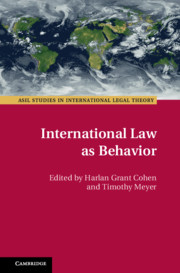Book contents
- International Law As Behavior
- ASIL Studies in International Legal Theory
- International Law As Behavior
- Copyright page
- Dedication
- Contents
- Tables
- Contributors
- Acknowledgments
- 1 International Law As Behavior
- 2 Deadlines As Behavior in Diplomacy and International Law
- 3 Cooperating without Sanctions
- 4 Egocentric Bias in Perceptions of Customary International Law
- 5 Explaining the Practical Purchase of Soft Law
- 6 Toward an Anthropology of International Law
- 7 Transnational Collaborations in Transitional Justice
- 8 Advancing Neuroscience in International Law
- 9 The Missing Persons of International Law Scholarship
- 10 The Wrong Way to Weigh Rights
- Index
7 - Transnational Collaborations in Transitional Justice
Published online by Cambridge University Press: 15 March 2021
- International Law As Behavior
- ASIL Studies in International Legal Theory
- International Law As Behavior
- Copyright page
- Dedication
- Contents
- Tables
- Contributors
- Acknowledgments
- 1 International Law As Behavior
- 2 Deadlines As Behavior in Diplomacy and International Law
- 3 Cooperating without Sanctions
- 4 Egocentric Bias in Perceptions of Customary International Law
- 5 Explaining the Practical Purchase of Soft Law
- 6 Toward an Anthropology of International Law
- 7 Transnational Collaborations in Transitional Justice
- 8 Advancing Neuroscience in International Law
- 9 The Missing Persons of International Law Scholarship
- 10 The Wrong Way to Weigh Rights
- Index
Summary
Hybrid tribunals are the international legal community’s response to the perceived weakness of fully international criminal tribunals in engaging national audiences and promoting reform of national legal systems. But despite locating themselves in the concerned post-conflict states or employing national attorneys, judges, and staff to serve alongside their international counterparts, hybrid criminal tribunals have not found these structural changes to be a quick fix. Instead, like international tribunals, they have also struggled to achieve their desired national legacy. This chapter focuses on one of the elements affecting hybrid tribunals’ performance in general and national impact in particular: the transnational collaboration between “internationals” and “nationals” that is one of the core features of hybrid tribunals. It explores the interpersonal and communal aspects of these transnational collaborations between nationals and internationals, building on previous work theorizing on these aspects of collaborations among internationals in international criminal law and rule of law initiatives, and drawing from a set of interviews with internationals who have worked in several transnational settings, including hybrid courts, other international criminal tribunals, and rule of law initiatives.
Keywords
- Type
- Chapter
- Information
- International Law as Behavior , pp. 158 - 190Publisher: Cambridge University PressPrint publication year: 2021

